
Nutrition: Health for the entire planet
According to the UN, the world population will grow to around 10 billion people in the next 30 years. Supplying these 2 billion more people than today’s population with food represents a huge global challenge. At the same time, climate change is reducing agricultural production and the downstream value chain through to the consumer must make more sustainable use of resources - in every way. The nutrition of the future should ensure that all people have access to the necessary nutrients and be healthy for the planet as well. Such a “planetary health diet” requires urgent innovation. That much is certain.
Wednesday, November 10, 2021
At present, humanity needs 1.75 Earths to cover its consumption. A Swiss consumer even needs 2.85 Earths. According to the EAT-Lancet Commission we need a “planetary health diet”, a nutrition plan that is both healthy and does not deprive the planet of more resources than it can provide. Our current food production is not resource-efficient and therefore is not sustainable. In order to be able to provide healthy nutrition to ten billion people by the year 2050 and not excessively burden the planet, we need new technologies in a wide variety of areas.

A nutrition plan for the planet
The meal plan of the “planetary health diet” looks different, especially for Europeans and Americans. In concrete terms, this means less meat - especially from animals whose feed production is in competition with human food - and less sugar or potatoes. These will be replaced with more vegetables, fruits, legumes and nuts. But the production of more plant-based foods also means using up more land. Biodiversity should be preserved on land on which nothing further will actually be built. As a result, more must be produced on the same or even decreasing acreage. This requires technical innovations and specialized knowledge at all levels of production and consumption.

Facilitate and allow future technologies
According to the "Food Trend Report" from the Gottlieb Duttweiler Institute, hotly discussed topics include green genetic engineering, laboratory-derived alternative protein sources to meat, more automation and networking in sales, augmented reality retail, and individualized menus and meals based on one’s DNA. What all technologies have in common is a more efficient use of available resources. Other topics being discussed include “Animal-free” dairy products or the extraction of flavorings from plastic waste. In addition to the technologies of the future, we also need to work on the problems of the present. The includes, for example, closing the so-called “micronutrient gap”.

Improve access to vitamins
Some two billion people have a “micronutrient gap,” In other words, they have insufficient access to adequate sources of vitamins and minerals. The EAT Lancet Report therefore estimates that vegetable and fruit production must be doubled by 2050 to enable a healthy, balanced diet for the entire world population. Today, only a fraction of the world's population consumes the recommended amounts of fruits and vegetables. In addition to increased fruit and vegetable production, dietary supplements and fortified foods will also play an increasingly important role. The best example of this is so-called “golden rice”. Rice fortified with vitamin A was recently approved in the Philippines, and in the future could save millions of children from vitamin A deficiency and associated blindness or death.
Many of these solutions listed as examples will require that people are able to overcome previous ways of thinking. “Natural is good, artificial is dangerous”, as the most simplistic of narratives, has worn out its welcome by now. Truly sustainable solutions can definitely come from the laboratory - in other words, “lab-based sustainability”.

Related articles

Genetic Engineering in Everyday Swiss Life – “There’s a Gene in Everything!”
The genetic engineering moratorium in place since 2005 gives the impression that Switzerland is largely free of genetic engineering. However, a closer look shows that genetic engineering has long since become part of our everyday lives – we just usually don’t notice it.

Global facts on world food and agriculture
Only thanks to technological progress and modern crop protection will we be able in the future to conserve our resources while feeding a growing population in a healthy and affordable way.

Pesticides in Green Smoothies
After countless recipes for Christmas cookies, festive roasts and cocktails, the advice on losing weight, detoxing and beautifying oneself now takes centre stage. Most of it is sheer nonsense.

Natural Toxins: An Underestimated Risk in Our Food
Safe food cannot be taken for granted. While chemical substances are often the focus of public criticism, reality shows that the greatest risks to food safety are of natural origin. Recent recalls of infant food products illustrate how insidious bacterial toxins or moulds can be.

